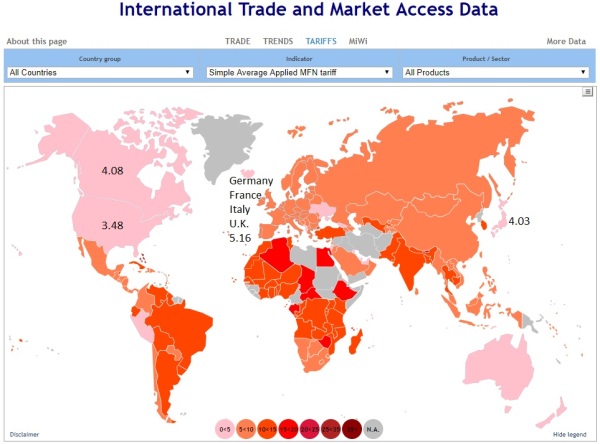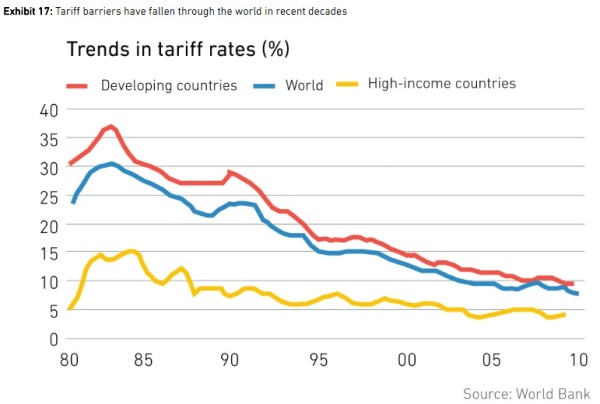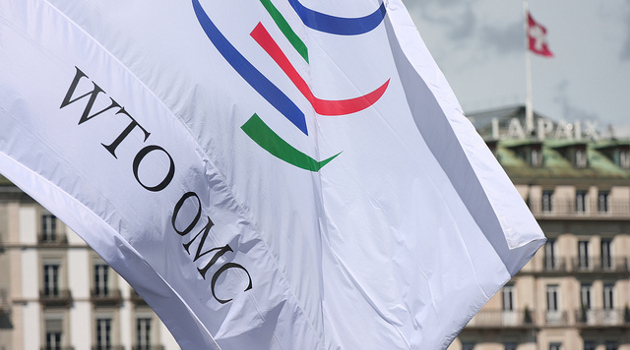Time for the final installment in my four-part video series on trade-related topics.
- Part I focused on the irrelevance of trade balances.
- Part II looked at specialization and comparative advantage.
- Part III explained trade and creative destruction.
Here’s Part IV, which looks at the very positive role of the World Trade Organization.
My basic argument is that it is a good idea to get other nations to reduce trade barriers, but tit-for-tat protectionism is not the right approach.
As I explained when writing about Chinese mercantilism, the U.S. would have far more success by using the WTO.
Let’s look at what experts have said.
Writing for the Wall Street Journal, Greg Rushford explained why the WTO is good for the United States.
President Harry S. Truman and Secretary of State George Marshall successfully pressed America’s war allies to create the General Agreement on Tariffs and Trade more than 70 years ago. Leaders across the globe, mindful of how economic nationalism in the 1930s had contributed to the devastation of World War II, wanted to open the world up again.
The agreement focused on slashing of tariffs and other barriers to trade—bringing unprecedented prosperity to hundreds of millions of people. The GATT, which evolved into the World Trade Organization in 1995, became the world’s most successful international economic experiment. …Despite Mr. Trump’s assertion that the WTO has been “a disaster” for the U.S., Washington has won 85% of the 117 WTO cases it has brought against foreign trading partners. Japan complained in 2003 that WTO jurists had stretched the law by determining that Japanese health officials used phony science to ban American apples. The real U.S. gripe is that foreign governments have won most of the 145 cases that they have brought against American protectionist policies. …Both political parties would be well-advised to consider the wisdom of Truman and Marshall. They understood that true national-security imperatives meant resisting protectionism.
And here’s some more background information from a column in the WSJ by James Bacchus, who served as both a Member of Congress and as a Chief Judge at the WTO.
…let’s say Mr. Trump managed to get his way and pull the U.S. out of the WTO. The consequences for the world and U.S. economies would be immense. Among them: diminished trade growth, costly market and supply-chain disruptions, and the destruction of jobs and profits, especially in import- and export-dependent U.S. industries.
The resulting trade barriers would compel some American companies either to downsize or move offshore. The global economic spiral set in motion by Mr. Trump’s reckless trade actions on steel, aluminum, Canada, Mexico, China, and Europe would accelerate. …WTO membership provides goods and services produced in the U.S. with protection against discrimination in foreign markets. Nondiscrimination rules are the heart of the WTO trading system, which currently applies in 164 countries and to 98% of all global commerce. …Instead of waging war on the WTO, the U.S. should help modernize it by making it more effective in addressing digital trade, services, subsidies, sustainability and intellectual property. Internationally agreed rules for international trade—and a process for resolving disputes about those rules—are an indispensable pillar of national prosperity.
I agree with everything in both columns.
And I’ll add one very simple – and hopefully very powerful – point.
Here’s a chart from the WTO showing that the United States is one of the world’s most pro-trade nations, with average tariffs of only 3.48 percent. Not as good as Hong Kong (0.0 percent) or Singapore (0.1 percent), but definitely good compared to most other nations.

In other words, it would be good if we could convince other nations to lower their trade barriers to our level.
Yet that’s exactly what’s been happening thanks to the WTO (and GATT, the predecessor pact). Here’s a chart prepared by the Confederation of British Industry, which shows how trade barriers have been continuously dropping. And dropping most rapidly in other nations, which is something Trump should be happy about.

The bottom line is that the WTO unambiguously advances U.S. interests, as I noted in the conclusion of the video.
But it actually advances the interests of all nations by gradually reducing global barriers to trade.
Is it as good as unilateral free trade? No, but it is a big win-win for America and the rest of the world.
Which is why, despite my usual disdain for international bureaucracies, I’m a big fan of the WTO.
———
Image credit: World Trade Organization | CC BY-SA 2.0.

